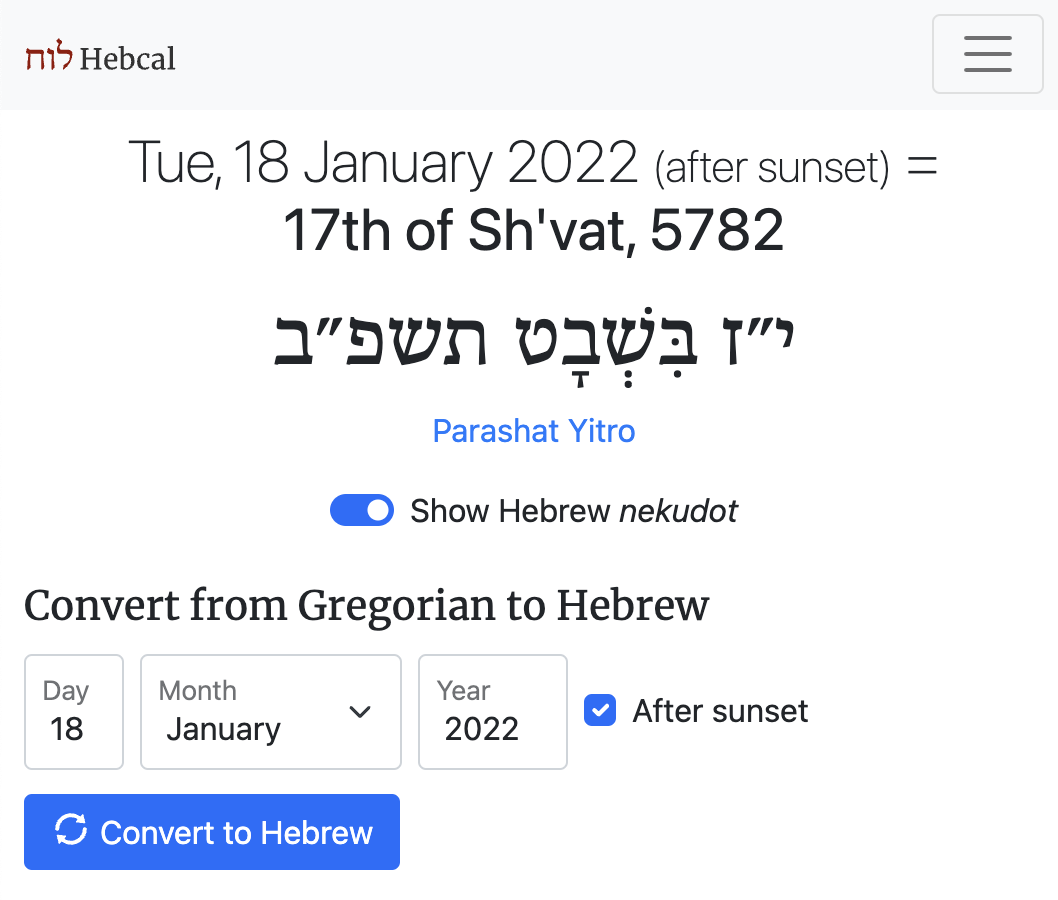
 Acharei Mot TTS, 3rd year (2022)
Acharei Mot TTS, 3rd year (2022)
Yad LaTorah (c) 2002 lists Acharei Mot 5782 (2022) 30th April as A3 [Lev 16:1-16:34]. However, hebcal today, 8 February 2022, displays B2 [Lev. 17:1-18:26]. Which is correct? See Yad LaTorah pp. 105-106.

Hi, thanks for using Hebcal's triennial Torah Reading feature.
In December 2021 we updated our Triennial readings to reflect the November 2020 responsa from the CJLS which modified the 3rd year readings for a half-dozen parshiyot. We published a short note about this change on the Hebcal.com website here:
https://www.hebcal.com/home/3824/triennial-torah-reading-revision
Since you reference Yad LaTorah from 2002, this obviously was published before the November 2020 CJLS responsa. So Yad LaTorah was correct at the time it was published, but it has become out-of-date.

 HebCal does not list Adar I or Adar II
HebCal does not list Adar I or Adar II
A relative of mine passed on March 17, 1968. My family yahrzeit list says it was Adar II, but when verifying the dates in HebCal, the system does not indicate it was Adar II. Is the system supposed to indicate whether there was a leapyear that year, and show Adar I or Adar II. If not, this is an essential feature.

Hi, thanks for using the Hebcal Hebrew/Gregorian date converter.
https://www.hebcal.com/converter?gd=17&gm=3&gy=1968&g2h=1
Sun, 17 March 1968 (before sunset) = 17th of Adar, 5728
Hebrew year 5728 was not a leap year (note month: Adar).
Since Hebrew Year 5728 was not a leap year, our converter page displays "Adar" as there is no ambiguity about the month of Adar in a non-leap year.

Hi, thanks for writing to the Hebcal Jewish Calendar support page.
We don't conduct Shabbat services - we're just an online calendar resource.
Hebcal (pronounced HEEB-kal, as in Hebrew calendar) is a free Jewish calendar and holiday web site.
Our mission is to increase awareness of Jewish holidays and to help Jews to be observant of the mitzvot.
We offer a powerful custom Jewish calendar tool that lets you generate a list of Jewish holidays for any year (past, present or future). Also available are a Hebrew date converter, Shabbat candle lighting times and Torah readings (both full kriyah and triennial system), and a page to look up yahrzeits, birthdays and anniversaries.

Hi,
https://www.hebcal.com/converter?gd=29&gm=3&gy=1942&g2h=1
- Sun, 29 March 1942 = 11th of Nisan, 5702
- י״א בְּנִיסָן תש״ב
Since Passover is the 15th of Nisan, the parsha that week was Pesach.

 outlook and ios
outlook and ios
I created a Yartzheit calendar in HebCal and imported it into my Outlook calendar. I also link all my oulook calendars on my Iphone.
The yartzeit dates display correctly on outlook on my computer. But they are way off on my iPhone. Examples : Outlook date (correct one) followed by the date displayed in iPhone. 1/7-1/31, 1/18-2/11, 1/19-2/12, 1/27-2/20.
Why does it do so and how can I fix it.

 Faulty converter
Faulty converter
Your converter from Gregorian Date to Hebrew date is OFF by one day. This is a highly irresponsible public "service." People are using your site to guide tombstone engravers, and they get the wrong dates from you!!.

Hi, thanks for writing to us. We're so sorry to hear about the difficulty you're having with Gregorian and Hebrew date conversion.
It's very important to us that we provide accurate information on our website. We checked and the date conversion is working correctly. Unfortunately, we aren't able to reproduce the error you mentioned. Could you send us a URL or a screenshot of the page where you are seeing something incorrect?
Please note that when converting from Gregorian to Hebrew dates there is an "After sunset" checkbox that can be checked or unchecked by the user:


 Hebcal says schedule for 2023! This is 2022! Please correct the website 🙏🏼
Hebcal says schedule for 2023! This is 2022! Please correct the website 🙏🏼
Hebcal says schedule for 2023! This is 2022! Please correct the website, thanks!

 Query Georgian Date from Hebrew Date?
Query Georgian Date from Hebrew Date?
Is it possible to query a Hebrew date and return the Georgian date?

Hi, thanks for using Hebcal!
Yes, the Hebrew Date Converter at https://www.hebcal.com/converter can convert from Hebrew dates to Gregorian dates.
If you are a software developer, the web API also supports conversion both ways
https://www.hebcal.com/home/219/hebrew-date-converter-rest-api

The Hebrew date converter can answer this question
https://www.hebcal.com/converter?hd=8&hm=Iyyar&hy=5782&h2g=1
- 8th of Iyyar, 5782 = Mon, 9 May 2022
- ח׳ בְּאִיָיר תשפ״ב
- 23rd day of the Omer
- Parashat Emor in the Diaspora
- Parashat Behar in Israel

 Apple watch - Purchased
Apple watch - Purchased
I downloaded the app on my Apple Watch and it worked perfectly. I upgraded to Apple watch 7 and it wont show up there. When I go back to the app store it says “Purchased” I cant even uninstall it and reinstall it. Please advise. Thanks a lot.

Hi, thanks for using the Hebcal Apple Watch app... and congrats on your new watch.
We've seen this issue before, and it's a problem because our watch app doesn't have a companion iPhone app. This is a new feature that Apple introduced recently and there are still some bugs with how the user experience works. The long-term fix for us will be to release an iPhone companion app.
In the short term, however, the best workaround we can recommend is to go to the App Store on the watch itself and search for (and install) Hebcal. By installing the app directly on the watch, it seems to work around this error.
We hope this helps! Happy Gregorian New Year.
Customer support service by UserEcho



